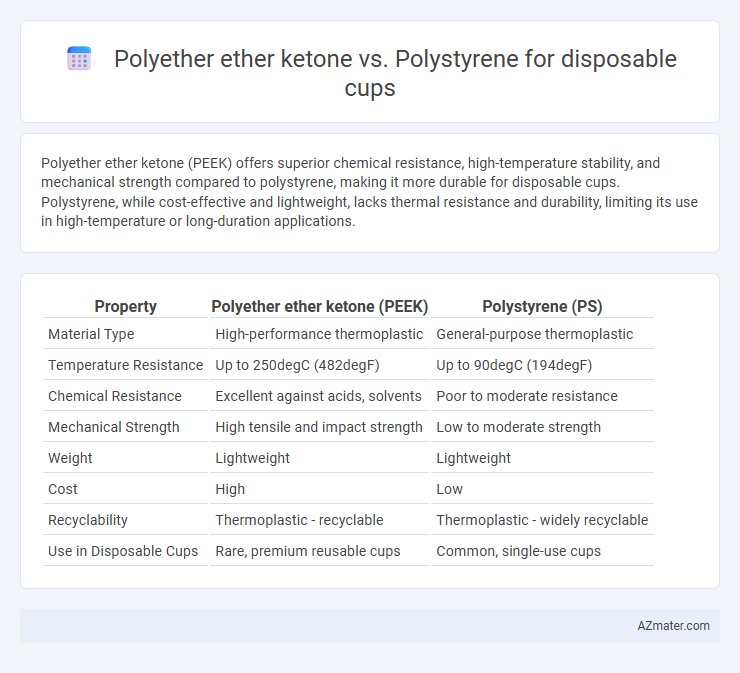Polyether ether ketone (PEEK) offers superior chemical resistance, high-temperature stability, and mechanical strength compared to polystyrene, making it more durable for disposable cups. Polystyrene, while cost-effective and lightweight, lacks thermal resistance and durability, limiting its use in high-temperature or long-duration applications.
Table of Comparison
| Property | Polyether ether ketone (PEEK) | Polystyrene (PS) |
|---|---|---|
| Material Type | High-performance thermoplastic | General-purpose thermoplastic |
| Temperature Resistance | Up to 250degC (482degF) | Up to 90degC (194degF) |
| Chemical Resistance | Excellent against acids, solvents | Poor to moderate resistance |
| Mechanical Strength | High tensile and impact strength | Low to moderate strength |
| Weight | Lightweight | Lightweight |
| Cost | High | Low |
| Recyclability | Thermoplastic - recyclable | Thermoplastic - widely recyclable |
| Use in Disposable Cups | Rare, premium reusable cups | Common, single-use cups |
Introduction to Polyether Ether Ketone and Polystyrene
Polyether ether ketone (PEEK) is a high-performance thermoplastic known for its excellent chemical resistance, mechanical strength, and thermal stability, making it suitable for demanding applications including reusable and specialty containers. Polystyrene (PS), a widely used polymer in disposable cups, offers low cost and ease of molding but suffers from poor heat resistance and limited environmental durability. Comparing PEEK and polystyrene highlights trade-offs between durability and cost-effectiveness in disposable cup manufacturing.
Material Properties: PEEK vs Polystyrene
Polyether ether ketone (PEEK) exhibits superior thermal stability with a melting point around 343degC, compared to polystyrene's 240degC, enabling PEEK to withstand higher temperatures without deformation. PEEK offers excellent chemical resistance and mechanical strength, making it more durable and suitable for repeated use, while polystyrene is more brittle and prone to cracking under stress. Additionally, PEEK's low moisture absorption and biocompatibility contrast with polystyrene's relatively higher water absorption and limited chemical resistance, influencing their performance as disposable cup materials.
Thermal Resistance Comparison
Polyether ether ketone (PEEK) exhibits superior thermal resistance compared to polystyrene, with a continuous service temperature of up to 250degC versus polystyrene's limit around 80-100degC. This high thermal stability allows PEEK disposable cups to withstand boiling liquids and microwave heating without deforming or releasing harmful substances. Polystyrene, commonly used for disposable cups, tends to soften and lose mechanical integrity at elevated temperatures, limiting its use for hot beverage applications.
Chemical Resistance and Safety
Polyether ether ketone (PEEK) exhibits superior chemical resistance compared to polystyrene (PS), effectively withstanding strong acids, bases, and organic solvents without degrading, making it highly suitable for disposable cups exposed to harsh chemicals. Polystyrene, while cost-effective, is prone to chemical leaching and deformation when in contact with hot liquids or aggressive substances, raising safety concerns for food and beverage use. PEEK's robust molecular structure ensures enhanced safety and durability in disposable cups, minimizing potential contamination and health risks.
Environmental Impact and Biodegradability
Polyether ether ketone (PEEK) offers superior chemical resistance and durability but is non-biodegradable and poses significant environmental challenges due to its long degradation time and difficulty in recycling. Polystyrene (PS), commonly used in disposable cups, is lightweight and inexpensive but contributes heavily to environmental pollution, as it breaks down into microplastics and has limited biodegradability in natural conditions. Both materials pose sustainability concerns, with ongoing research seeking biodegradable alternatives or improved recycling methods to reduce their ecological footprint.
Manufacturing Process and Scalability
Polyether ether ketone (PEEK) offers a high-temperature thermoplastic manufacturing process involving injection molding or extrusion, allowing precise control over cup wall thickness and enhanced mechanical properties. Polystyrene (PS), favored for disposable cups, uses injection molding or foam molding with rapid cycle times, contributing to its cost-effective mass production and scalability. While PEEK provides superior durability and chemical resistance, polystyrene's simpler and faster manufacturing process supports higher scalability for large-volume disposable cup production.
Cost Effectiveness Analysis
Polyether ether ketone (PEEK) offers superior thermal stability and chemical resistance compared to polystyrene, yet it incurs significantly higher material and manufacturing costs. Polystyrene dominates the disposable cup market due to its low cost, ease of molding, and adequate performance for single-use applications. Cost-effectiveness analysis clearly favors polystyrene for disposable cups where budget constraints and mass production are critical factors, despite PEEK's enhanced durability and recyclability.
Application Suitability for Disposable Cups
Polyether ether ketone (PEEK) offers superior chemical resistance, high thermal stability, and excellent mechanical strength, making it suitable for premium reusable cups but less cost-effective for disposable cups. Polystyrene (PS) is widely used for disposable cups due to its low cost, ease of molding, and adequate thermal insulation for short-term use. For disposable cup applications, polystyrene remains the preferred material because of its economic efficiency and sufficient performance in single-use scenarios.
Consumer Health and Regulatory Compliance
Polyether ether ketone (PEEK) offers superior chemical resistance and thermal stability compared to polystyrene, reducing the risk of leaching harmful substances into beverages, which enhances consumer health safety. Regulatory bodies such as the FDA and EU food contact regulations favor materials like PEEK for their inert properties and compliance with strict migration limits, ensuring safer disposable cup use. Polystyrene, while cost-effective, often faces scrutiny due to styrene monomer migration and environmental health concerns, posing challenges in meeting evolving regulatory standards.
Future Trends in Disposable Cup Materials
Polyether ether ketone (PEEK) offers superior thermal stability and chemical resistance compared to polystyrene, making it a promising material for high-performance disposable cups in future markets. Innovations in biodegradable PEEK composites aim to combine durability with environmental sustainability, addressing growing consumer demand for eco-friendly packaging. Polystyrene, while cost-effective and widely used, faces declining popularity due to its limited recyclability and environmental concerns, driving research towards more sustainable alternatives like enhanced PEEK-based materials.

Infographic: Polyether ether ketone vs Polystyrene for Disposable cup
 azmater.com
azmater.com